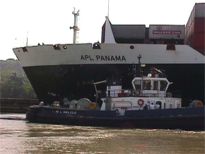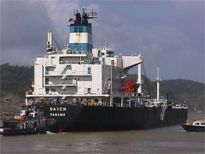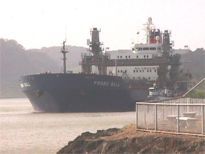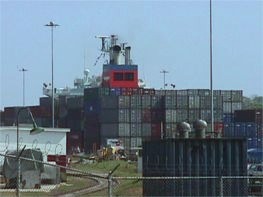 |
|
|
BACKGROUND
Panama is an international maritime center
for banking, insurance, finance and shipping. Over
seven thousand large ships and vessels from around
the world fly the Panamanian flag, and
Given the clear advantages to ships flying the Panamanian flag, coupled with Panama’s strategic geographical position in world shipping, it is clear why the Panamanian Ship Registry has become the world’s largest registry, both in terms of gross tonnage and in number of vessels registered. The Panamanian laws and regulations governing the flagging and operation of Panamanian flagged ships are simple, yet complete. They afford the vessel’s owners the legal security of established maritime judicial protection, while providing them with a strict regulatory safety framework.
ADVANTAGESSince its foundation over 75 years ago, the Panamanian Ship Registry has grown to become the world’s largest registry, both in terms of gross tonnage and number of vessels flying the Panamanian flag. In addition to cargo & passenger vessels, the Registry includes offshore drilling platforms, dredges, barges, and private yachts, over 7,000 vessels of 100 Gross Tons or greater. Any person or corporation, regardless of their nationality, may register virtually any marine vessel in the Registry. Vessels transferred to the Registry do not have to be re-surveyed if they hold current safety and tonnage certificates issued by a recognized entity. All revenues from Panamanian flagged ships are completely tax exempt, even if the transportation contract was executed in Panama. Similarly, any capital gains from the sale or transfer of a Panamanian flagged ship are tax exempt, even if the sale was executed in Panama.
ADVANTAGES (cont’d)The registry imposes no minimum tonnage requirement, and vessels of any size, type or age are eligible for registration.
Panama’s Maritime Tribunal is recognized worldwide for its
efficiency and compliance with global maritime standards. This
Panama has an extensive network of worldwide maritime consulates, located in major ports, which facilitates maritime transactions of Panamanian flagged vessels. Ship registry can be conveniently handled via this network. Panama’s time-tested corporate and ship mortgage laws are among the world’s best, in terms of stability, judicial protection, and regulatory protection.
ADVANTAGES (cont’d)Panama’s Registry boasts one of the world’s best records in environmental and safety compliance, and in vessel loss prevention. Panama now has over 1,000 inspectors in over 300 ports, insuring compliance worldwide. The Panamanian professional community offers ship owners a broad array of world class maritime services, including legal, accounting, banking, finance and insurance. Given this solid maritime services framework, coupled with the U.S. dollar as Panama’s currency, many ship owners utilize Panama as a “one stop” center for all their personal and corporate needs. Garibaldo & Associates can provide ship owners with Registrations, Corporations, Personal Foundations, Trusts, and other services, as required.
REGISTRATION *A vessel’s enrollment in the Panamanian Registry is simple and efficient. A Provisional Patent is applied for and issued for a six month period (and can be extended for another three months). Applications can be filed in Panama, or through Panamanian Maritime Consulates around the world.
Once the Provisional Patent has been issued, the vessel’s
title documents (bill of sale; or construction certificate,
if new; naval
Additionally, a Radio License is required for all vessels in the Panamanian Registry. A three month Provisional License is applied for and issued with the Provisional Patent; the Permanent License is applied for and issued with the Permanent Patent, is good for four years, and is renewable indefinitely. Finally, a three month, non-renewable Temporary Patent is available for those vessels to be scrapped, transited, or otherwise temporarily navigated.
FILING REQUIRE-MENTS OVERVIEW *Required information and documentation for Provisional and Permanent Patents is fairly straightforward. Information required includes: current and previous names of the vessel; its type and IMO #; owner’s name and address; admeasurements including tonnage; technical information such as engine data; shipyard, year and place of construction; radio accounting authority; classification society; etc. Documentation submission may be waived for Temporary Patents but is mandatory for Permanent Patents. Documentation must be duly notarized and authenticated by Panamanian Consul or Apostille. Documents required include: Bill of Sale; Acceptance of Sale; Builder’s Certificate (if new); Limited Power of Attorney (to act as Resident Agent & Legal Representative in Panama); Deletion Certificate from Previous Registry; Admeasurement or Tonnage Certificate; Radio License Application; and Report of Inspection for vessels over 20 years old.
NAVAL MORTGAGES *A Panamanian flagged vessel’s naval mortgage may be executed in Panama or any other country, but must be registered in Panama’s Public Registry. It will not be effective against third parties until it is duly registered. The mortgage may be written or executed in any language or form.
While there are no restrictions as to
the language, provisions or requirements agreed to by the
parties, a mortgage
Special naval mortgage provisions are required for ships under construction. Please see the Registry Requirements and Information Document for further details. Existing registered naval mortgages may be amended, discharged or eliminated by written, notarized consent of both parties. * See Ships Registry Details Document for more information. |
|
|
|||||
 |
 |
 |
|||
 |
 |
 |
|||
| Home | |||||

 enjoy Panama’s offshore tax free status and
strict maritime safety, regulatory and legal protection.
enjoy Panama’s offshore tax free status and
strict maritime safety, regulatory and legal protection.  facilitates any required maritime legal
transactions, regardless of where the vessel may be
lying. The Court can handle any maritime dispute,
including claims, sequesters, and labor matters.
Given the importance of shipping to Panama, the Court is
available 24 hours a day, 365 days a year.
facilitates any required maritime legal
transactions, regardless of where the vessel may be
lying. The Court can handle any maritime dispute,
including claims, sequesters, and labor matters.
Given the importance of shipping to Panama, the Court is
available 24 hours a day, 365 days a year.  mortgages) must be filed in Panama’s Public Registry.
Thereafter, a Permanent Patent is applied for and
issued. The Permanent Patent is good for four
years for commercial vessels and two years for
pleasure vessels. The Permanent Patent is
renewable indefinitely for equal terms as
long as the vessel is in compliance with Registry laws and
regulations and is current on payment of Registry taxes and fees.
mortgages) must be filed in Panama’s Public Registry.
Thereafter, a Permanent Patent is applied for and
issued. The Permanent Patent is good for four
years for commercial vessels and two years for
pleasure vessels. The Permanent Patent is
renewable indefinitely for equal terms as
long as the vessel is in compliance with Registry laws and
regulations and is current on payment of Registry taxes and fees.  to be registered must contain the following
information: names
& addresses of mortgagor & mortgagee; fixed or
maximum mortgaged principal; principal and interest payment
schedules; interest rate or manner of determining interest
rates; mortgaged vessel’s name, Patent #, tonnages and
dimensions; & for multiple vessel (fleet) mortgages,
the encumbrance of each vessel.
to be registered must contain the following
information: names
& addresses of mortgagor & mortgagee; fixed or
maximum mortgaged principal; principal and interest payment
schedules; interest rate or manner of determining interest
rates; mortgaged vessel’s name, Patent #, tonnages and
dimensions; & for multiple vessel (fleet) mortgages,
the encumbrance of each vessel.